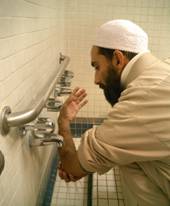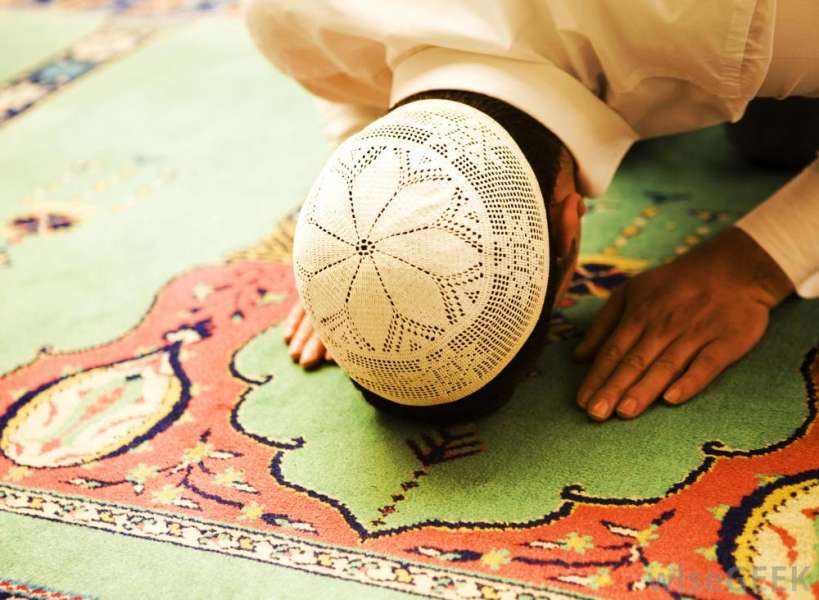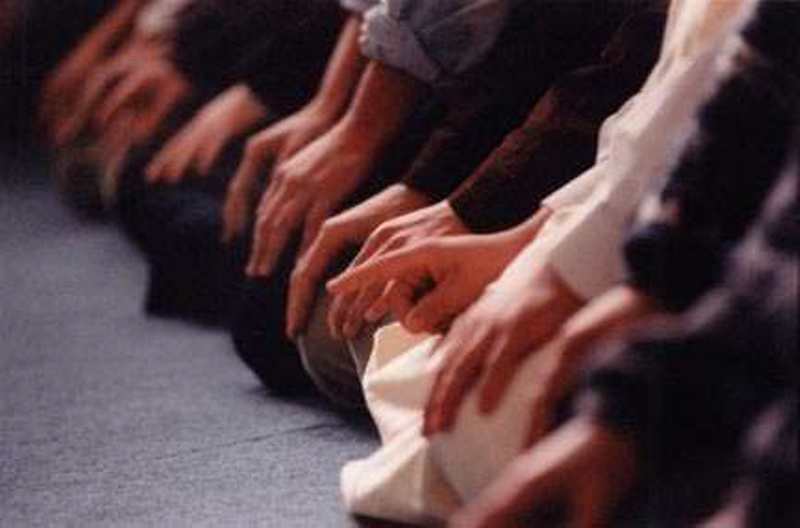PRAYER
:From the book “Prayer” by Prof. Dr. Ghulam Zarquani Quadri.
For the Prayer one must be in the state of “Taharah”. Taharah can be achieved either through WUDU or taking bath. In some rare situation, TAYAMMUM, a replacement of wudu or bathing, would also provide Taharah.
First, we will describe the process of Wudu and then the way of performing Prayer with its all types, will be mentioned in detail.
Way To Perform WUDU (Ablution):
- To perform the intention for Wudu.
Aside from the four mandatory actions, intention is preferable based on the renowned saying of the Prophet Muhammad Mustafa ( Peace be upon him) said,
….. ِنَّمَا الْاَعْمَالُ بِالنِّیَّاتِ
“Actions are judged by intentions.” [ Bukhari: Imam Ismail ]
In light of the above Hadith, making intention before making Wudu is a Sunnah [the Prophetic Way]. - To recite the Bismillah completely.
The Messenger of Allah (Peace be upon him) said,
کُلُّ اَمْرٍذِیْ بَالٍ لَا یُبْدَأُ فِیْہِ بِبِسْمِ اللّٰہِ الْرَحْمٰنِ الرَّحِیْمِ اَقْطَعُ
[ Jame-ul-Masaneed wal Maraseel:Imam Jalaluddin Suyuti Vol: 5, Page: 430, Date: 1994, Darul Fikr]
” Any important action which is not started with [Bismilla hir-rahman nir-raheem] remains incomplete.” - To first wash both hands up to the wrists three times.
The Beloved Prophet (Peace be upon him) said,
اِذَا اسْتَیْقَظَ اَحَدُکُمْ مِنْ نَوْمِہٖ فَلْیَغْسَلْ یَدَہٗ قَبْلَ اَنْ یُّدْخُلَھَا فِیْ وَضُوْءِ ہٖ
[ Bukhari, Vol: 1, Page: 159 ]
Farid Book Depot Delhi.” Whenever anyone of you wakes up he should wash his hands before putting it into water. “ - To perform Miswak while washing the mouth [Cleaning of the teeth using a wooden stick].
The Rasoolullah (Peace be upon him) said,
لَوْلَا اَنْ اَشُقَّ عَلٰی اُمَّتِیْ لَاَمَرْتُھُمْ بِالسِّوَاکِ عِنْدَ کُلِّ صَلٰوۃٍ
[ Muslim: Imam Muslim, Vol: 1, Page: 909]
” Had I not felt that it would be hard for my Ummah [nation] I would have surely ordered them perform Miswak before each prayer.” - To gargle three times.
- To take up water into the soft part of the nose [upto where the hard-bone begins] three times.
- Using right hand for actions 3 through 5.
- To clean the nostrils using the smallest [pinky] finger of the left hand. These Sunan have been mentioned in the saying of the Noble Prophet (Peace be upon him) as he said,
مَامِنْکُمْ رَجُلٌ یَقْرُبُ وُضُوْ ءَ ہٗ فَیَتَمَضْمَضُ وَیَسْتَنْشِقُ فَیَنْتَثِرُ اِلَّا خَرَّتْ خَطَایَاوَجْھِہٖ
[ Muslim, Vol: 6, Page:95]
” When anyone of you starts to make Wudu, he should gargle, take up water into the nose, and clean his nostrils, so that his sins will go away.” - To pass wet-fingers through the beard.
اِنَّ النَّبِیَّ صلی اللہ علیہ وسلم کاَنَ یُخَلِّلُ لِحْیَتَہٗ
[ Tirmizi, Vol:1, Page:119]
Narrated on the authority of Imam Tirmidi that, ‘Rasolullah (Peace be upon him) would pass his wet-fingers through his beard.’ - To wash each part three times.
عَنْ ابْنِ عُمَرَ رضی اللہ عنھماقَالَ: تَوَضَّأَ رَسُوْلُ اللّٰہِ صلی اللہ علیہ وسلم وَاحِدَۃً وَاحِدَۃً ، فَقَالَ: ھٰذا وُضُوْءٌ مَنْ لَّا یَقْبَلُ اللّٰہُ صَلَاۃً اِلَّا بِہٖ، ثُم تَوَضَّأَ ثِنَتَیْنِ ثِنَتَیْنِ، فَقَالَ: ھٰذَاوُضُوْءُ الْقَدْرِ مِنَ الْوُضُوْءِ ، وَتَوَضَّأَ ثَلَاثاً ثَلَاثاً وَقَالَ: ھَذَا اَسْبَغُ الْوُضُوْءِ
[Ibn-e-Maja: Shaikh Imam Muhammed bin Yazid, Vol:1]
” Narrated by Hadhrat Abdullah bin Umar (May Allah be pleased with them) that, ‘The Merciful Prophet (Peace be upon him) performed Wudu, in which he washed every part once then said, ‘this is the wudu, without it Allah does not accept Prayer.’ Then he washed every part two times and said, ‘this is the moderate type of Wudu.’ Then he washed every part three times and said, ‘this is the complete form of Wudu. “ - Washing entire face three times, which must cover from the point where the hair starts to normally grow to the bottom of the chin and from one ear to the other ear.
- Washing both arms from the finger-tips up to including the elbows three times.
- Passing wet hands over the entire hair.
ثُمَّ مَسَحَ بِیَدَیْہِ فَاَقْبَلَ بِھِمَا وَاَدْبَرَ، بَدَأَ بِمُقَدَّمِ رَأْسِہٖ حَتّٰی ذَھَبَ بِھِمَا اِلٰی قَفَاہٗ ثُمَّ رَدَّھُمَا اِلٰی الْمَکَانِ الَّذِیْ بَدَأَ مِنْہُ
[ Bukhari, Vol: 1, P: 167]
” Hadhrat Abdullah bin Zaid (May Allah be pleased with him) while showing the people the wudu of Rasoolullah (Peace and blessings of Allah be upon him) passed his hands over his head beginning with the front taking them to the back of his head to the nape of the neck and then brought them to the front again from where he had started. “ - Passing wet hands outside the ears.
عَنِ ابْنِ عَبَّاس اَنَّ رَسُوْلَ اللّٰہِ صلی اللہ علیہ و سلم مَسَحََ اُذُنَیْہِ، دَاخِلَھُمَا بِالسَّبَّابَتَیْنِ،وَ خَالَفَ اِبْھَامَیْہِ اِلٰی ظَاھِرِ اُذُنَیْہِ فَمَسَحَ ظَاہِرَھُمَا وَبَاطِنَہُمَا
[Ibn-e-Maja, Vol:1, Page:151]
” Shaikh Ibn Abbas (May Allah be pleased with him) narrates that, the Prophet ( Peace be upon him) used the wet index fingers to pass over the inside of the ear and His thumbs to pass over the back of the ears. “ - Washing both feet from the tips of the toes up to including the ankles.
For the reference of (10) to the (15) one may read this verse of the Holy Quran;
یٰٓاَیُّھَا الَّذِیْنَ اٰمَنُوْا اِذَا قُمْتُمْ اِلَی الصَّلٰواۃِ فَاغْسِلُوْا وُجُوْھَکُمْ وَاَیْدِیَکُمْ اِلَی الْمَرَافِقِ وَامْسَحُوْا بِرُءُ وْسِکُمْ وَاَرْجُلَکُمْ اِلَی الْکَعْبَیْنِ
[ Holy Quran, Chaper: 5, Verse:6]

Types of the Prayer
- First Prayer: It is named as “Fajr Prayer”.
- 2 Rakaat Stressed Sunnah
- 2 Rakaat Mandatory
- Second Prayer: It is named as “Zuhr Prayer”.
- 4 Rakaat Stressed Sunnah
- 4 Rakaat Mandatory
- 2 Rakaat Stressed Sunnah
- 2 Rakaat optional
- Third Prayer: It is named as “Asr Prayer”.
- 4 Rakaat Unstressed Sunnah
- 4 Rakaat Mandatory
- Fourth Prayer: It is named as “Maghrib Prayer”.
- 3 Rakaat Mandatory
- 2 Rakaat Stressed Sunnah
- 2 Rakaat optional
- Fifth Prayer: It is named as “Isha Prayer”.
- 4 Rakaat Unstressed Sunnah
- 4 Rakaat Mandatory
- 2 Rakaat Stressed Sunnah
- 2 Rakaat optional
- 3 Rakaat Witr
- 2 Rakaat optional
NOTE: ONE MAY SHORTEN HIS OR HER PRAYER ON “STRESSED SUNNAH”, “MANDATORY” AND “WITR” PRAYERS.

Way of the Prayer
Making Prayer Alone
- MANDATORY PRAYER
After taking care of all pre-requisites of the Prayer, one gets ready to start the Prayer and follow these instructions:- Make intention
- Raise both hands up to the lobes for men and up to the shoulder for women and tie hands below the belly button for men and on the chest for women saying ” Allahu Akbar”
- Recite Sana ” Sub ha na ka Allahum ma wa bi ham di ka wa tabarakas muka wa ta aa la jad du ka wa la ila ha Ghai ru ka”
- Recite
اعوذ باللہ من الشیطان الرجیم
“A oo zu bil laa hi mi nash shai ta nir ra jeem”
بسم اللہ الرحمن الرحیم
“Bis mil la hir rah ma nir raheem” - Read surah Al hamd from the Quran which is “Al ham du lil laahi Rab bil aa la meen. Ar rah maanir raheem. Mali ki yaumid deen. Ie ya ka na’ bu du wa ie ya ka nas taeen. Ih de nas sira tal mus taqeem. Siratal la zeena an amta alai him Ghai ril magh du bi aa lai him wa ladh daal leen. “
- Add any other surah or some verses of the Quran like Sura kausar, which is “In na aa tai na kal kausar. Fa sal le li rab bika wan har. Inna shani aa ka hu wal ab tar”
- Say Allah hu ak bar and bow down and recite at least three times.
سبحان ربی العظیم
” Sub ha na rab bi al azeem” - Get up completely saying “Allah hu akbar” and Rab bana la kal hamd”.”
- Go for prostration saying “Allah hu akbar” and read three times
سبحان ربی الاعلی
” Sub ha na rab bi al aa la” - Sit down completely saying “Allah hu akbar” and then make another prostration and read the same.
NOTE: At this point you have performed ONE RAKAAT of the Prayer.
- Stand up saying ” Allah hu akbar” and Read surah “Al hamd” as you have read earlier. Then read any surah like “Sura Ikhlaas”
“Qul hu al laa hu ahad. Allahus samad. Lam ya lid wa lam yuu lad. Wa lam ya kul lahu kufu wan aa had.” - Repeat same actions up to the second prostration then sit down.
- Recite “At tahi yaat” and “Drood” with “Dua” completely, then make salam to the right side first and then on the left side saying “As salamu alaikum wa rah matul laah” But if this Prayer consists of more than two Rakaats then after recitation of “At tahi yaat” stand up.
AT TAHI YAAT: At ta hi ya tu lil laahi was sala watu wat tai ye baa tu. As salamu alaika aai yu han na biyu wa rah ma tul laa hi wa ba ra ka tu hu. As salamu alai na wa aa la iba dil la his sa leheen. Ash ha du an la ila ha ha il lal lahu wa ash hadu an na Muhammadan ab du hu wa ra so lu hu.
Note: During the recitation of At tahi yaat, when one says “La ila ha” , they should raise the right index finger up, while folding the other fingers into the palm like forming a fist, then replace it back while saying “Il lal lahu”.
DROOD: Al la hum ma Sal le aa la Sai ye de na Muhammadin wa aa la aa li sai ye de na Muhammadin kama sal lai ta aa la sai ye de na Ibraheema wa aa la aa le sai ye de na Ibraheema in na ka Hameedum ma jeed. Al la hum ma baarik aa la sai ye de na Muhammadin wa aa la aa li sai ye de na Muhammadin kama ba rakta aa la sai ye de na Ibraheema wa aa la aa li sai ye de na Ibraheema in na ka Hammedum ma jeed.
DUA: Rab bigh fir li war ham ni.
- In the third and fourth Rakaats, one should recite surah “Al hamd” only and follow the same action for a Rakaat as you did, then at the Last Sitting recite “At tahi yaat”
and “Drood” with “Dua” completely and perform Salam as mentioned above.
- WITR PRAYER:
- After completing two Rakaats, stand up.
- Recite surah “Alhamdu” completely and any other surah or some verses of the Holy Quran.
- Raise hands up to the lobes for men and up to the shoulders for women saying “Al la hu akbar” and refold them.
- Recite “Dau-e-Qanoot” secretly.
Note: If one does not memorize Dau-e-Qanoot, then he should say, “Allahum magh fir la naa” three times.
- Then complete the Prayer following the same actions as one did in the last Rakaat of any Mandatory Prayer.
- STRESSED SUNNAH:
The way of praying Stressed Sunnah is as performing any Mandatory Prayer except the following,- In the third and fourth rakaat, add any surah or some verses after the recitation of surah “Al hamd”
- UNSTRESSED SUNNAH:
The way of praying Unstressed Sunnah and Optional Prayer is as praying any Mandatory Prayer excecpt the following,- In the first sitting recite “At tahi yaat” and “Drood” too.
- At the beginning of third Rakaat, read Sana,
بسم اللہ الرحمن الرحیم and اعوذ باللہ من الشیطان الرجیم - In the third and fourth Rakaats, add any other surah or some verses after recitation of surah “Al hamd”.
Making Prayer with an Imam
- The way of praying for a follower is as same as making Mandatory Prayer alone except;
- Followers are not allowed to recite neither surah nor any other surah behind an Imam.
- While Imam says “Sami Allahu li man Hamidah” followers should say “Rab ba na wa la kal hamd” only.
- WITR PRAYER:In the month of Holy Ramadhan, it is preferred to perform Witr Prayer behind an Imam with a condition of making Isha Prayer also behind an Imam.
However, if one could not make his Isha Prayer following an Imam, he is not supposed to make his Witr Prayer behind him, rather, he must make it individually following the way we have discussed earlier.
For making Witr Prayer behind an Imam, one should follow the same way as making any Mandatory Prayer behind an Imam except the following;- At the takbeer “Al la hu ak bar”, in the third rakaat after the recitation of surah “Al hamd” completely and any other surah or some verses, raise hands up to the lobes for men and up to the shoulders for women then read “Dua-e-Qunoot” or its replacement quietly.
VERY IMPORTANT NOTE: Arabic transliteration of the Quran is not possible as with the pronunciation changes, the meaning messed up. Therefore, you are requested to listen this clip for the true pronunciation of the Quranic chapters.


